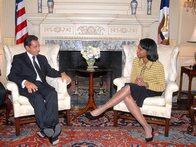There Are Just Some Countries Most Americans Don’t Want To Defend
Thirteen percent (13%) of Americans say the United States should provide military assistance to North Korea to help that country defend itself if it is attacked.

Thirteen percent (13%) of Americans say the United States should provide military assistance to North Korea to help that country defend itself if it is attacked.

Most Americans aren’t carrying a grudge about D-Day and Pearl Harbor these days, that’s for sure. But the war in Vietnam is still obviously a sore subject.

Both are developing nuclear weapons and refuse to listen to the United Nations and other international mediators who are trying to talk them out of it. They’re also the nations that sizable majorities of Americans consider to be the biggest enemies of the United States.

The United States has been the world’s sole superpower since the fall of the Soviet Union in the early ‘90s, but as far as most Americans are concerned, we haven’t made any new friends since then.

The United States still has a long way to go building friendships in the Middle East despite President Obama’s highly-publicized outreach to the Muslim world.

For most Baby Boomers, the Vietnam War was a watershed moment, with the names of the dead memorialized on a black marble wall in Washington, D.C., and on similar monuments around the country. Thirty-four years after that war finally ended, Americans are evenly divided over whether Vietnam is an ally or still an enemy of the United States.

Forty-three percent (43%) believe that France and the U.S. will become closer allies following the election of Nicolas Sarkozy as President of France.

Only 18% of Americans agree that France is an ally in the war on terror. Almost as many believe France is an enemy in that war.